What is meant by risk management?

Risk Management Explained
Risk management is the process of identifying, assessing, and prioritizing potential risks that could negatively impact an organization, project, or individual. The goal of risk management is to minimize the likelihood and impact of these risks, ensuring that objectives can be achieved with minimal disruption.
Key Steps in Risk Management
- Identification: Recognizing potential risks that could affect goals or outcomes.
- Assessment: Evaluating the likelihood and potential impact of each risk.
- Prioritization: Ranking risks based on their severity and probability.
- Mitigation: Developing strategies and actions to reduce or eliminate risks.
- Monitoring: Continuously tracking risks and the effectiveness of mitigation measures.
Why Is Risk Management Important?
- Prevents losses: Helps organizations anticipate and avoid costly issues.
- Improves decision-making: Enables informed choices by understanding potential threats and opportunities.
- Enhances resilience: Increases the ability to recover from unexpected events.